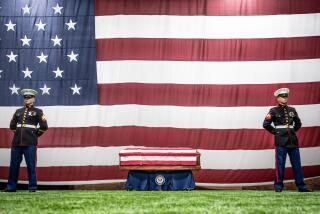Hope Seen Amid Violence
- Share via
RAMADI, Iraq — The American commanders watched with disbelief as the lines formed.
For so long, they had tried with little success to get Sunni Arabs in this volatile western city to participate in Iraq’s new government institutions, particularly its security forces. But after months of cajoling and high-level negotiations with tribal leaders, they finally began seeing progress this week: Young men were queuing up by the hundreds, ready to join Ramadi’s police force.
On Thursday morning, the recruits streamed into the grounds of an abandoned glass factory where applications were being processed. They went through background checks, physical exams and tests of their reading skills.
Some applicants took fitness tests outdoors, running across the dusty factory grounds and doing sit-ups on thin foam mattresses as U.S. soldiers watched. Inside, other men filled out printed forms, scribbling away intently. Many wore their finest clothes.
Then, just after 9 a.m., a suicide bomber standing in the crowd outside the factory gates detonated a vest packed with explosives and ball bearings.
The U.S. military said at least 30 people were killed in the blast, but Iraqi hospital officials put the death toll at 70. Among the dead were two U.S. troops and three Iraqi soldiers.
U.S. Army Col. John L. Gronski said the blast was an attempt by insurgents to discourage people from joining the U.S.-backed security forces. Hours after the explosion, though, several Ramadi men struck a note of defiance, returning to finish their applications even as ambulances were still carrying away victims.
“We came here to take care of the security, because if we don’t do it, who else will?” Majid Said, 30, said after the explosion. He had come with a large group of cousins to sign up. “We came here to volunteer, especially to get rid of these people.”
Although the attack was a setback, American commanders said they hoped it would galvanize local sentiments against the insurgency and drive a wedge between residents and more hard-core followers of Abu Musab Zarqawi’s group Al Qaeda in Iraq, which they believed was behind the bombing.
“This is Al Qaeda in Iraq, certainly not local insurgents,” Gronski said after a meeting with the governor of Al Anbar province, of which Ramadi is the capital. “The key message is that the young men of Anbar province who were here today were not deterred by the attacks.”
Adnan Salih, 32, was among the recruits who came early Thursday and stayed through the day.
“If I had wanted to leave, I would have left already,” Salih said after the explosion. He also had brought friends and relatives. “Some of my friends didn’t want to come, but I convinced them.”
U.S. commanders quickly sought to turn the situation to their advantage in the ongoing war for hearts and minds in the predominantly Sunni Arab province.
“Maybe this is an opportunity if we get the right message out,” said Maj. Robert Rice of the 2nd Marine Expeditionary Force (Forward), who oversees the Iraqi police program in Al Anbar. “This could really backfire and become the thing that really separates them.”
U.S. military officials believe that the vast majority of young men in Ramadi are involved in the insurgency. But American commanders are eager to uncouple local Sunni rebels from radical Islamic fundamentalists in an effort to weaken the overall insurgency.
“Ramadi is probably the decisive city in the province,” Rice said. “If you get Ramadi right, the rest of the province will follow.”
High-ranking U.S. military officials met recently with tribal leaders to discuss the creation of a local police force. Prominent sheiks in the city agreed to endorse police recruitment in the city, and in the last week, mosques issued public announcements encouraging residents to sign up for the security forces. Close to 1,300 recruits signed up in three days this week.
After visiting wounded Iraqis on the American base, Al Anbar Gov. Mamoun Sami Alwani said he did not think the incident would derail the recruitment effort.
“Regardless of this criminal act, the sons of Al Anbar still wanted to come and continue volunteering,” he said. “This won’t affect the process because people are willing and wanting this to happen. The sons of Al Anbar want to build the province with their own hands.”
Special correspondent Asmaa Waguih contributed to this report.
More to Read
Sign up for Essential California
The most important California stories and recommendations in your inbox every morning.
You may occasionally receive promotional content from the Los Angeles Times.












